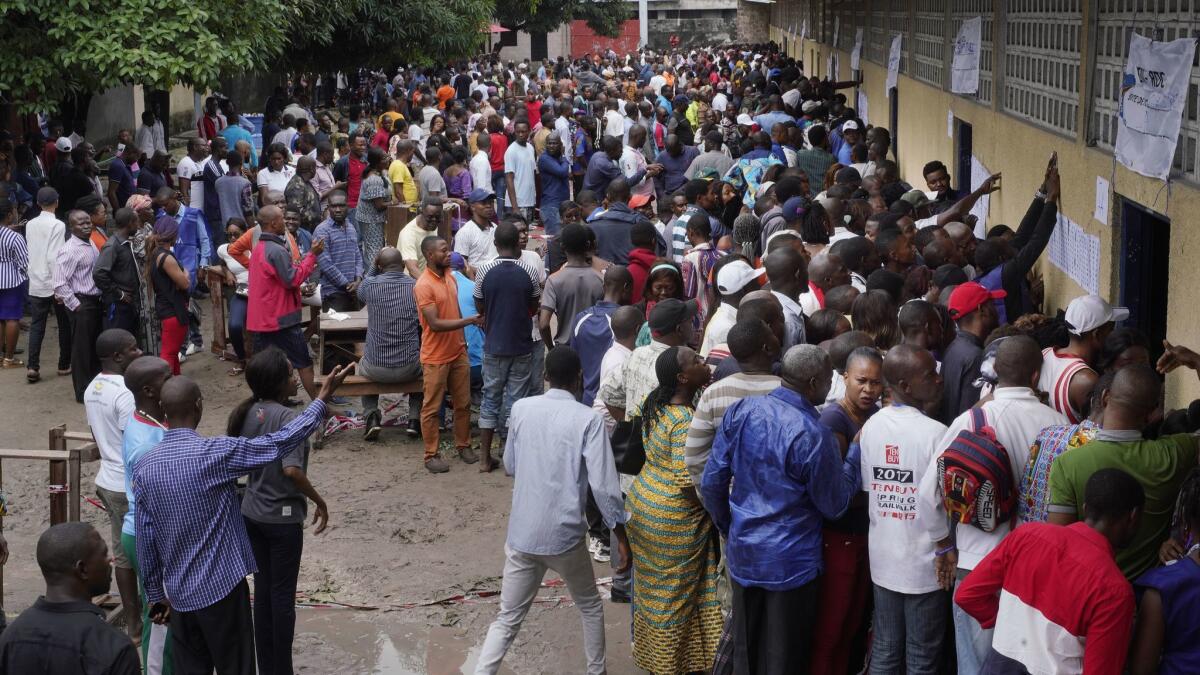Voters in Congo face delays and irregularities in historic presidential election

- Share via
Reporting from Kinshasa, Congo — After more than two years of delays, Congo went to the polls Sunday in an election that holds both the promise of a democratic transition and the potential for large-scale violence should the results be seen as unfair. But by the time most polls closed, alarming irregularities were reported from across the country.
Millions of voters were met with nonexistent voter rolls and hundreds of malfunctioning or missing voting machines, and hundreds of cases of election observers saying they were barred from polling stations.
Vote counting began late Sunday night. The election commission says provisional results will be announced within a week and definitive ones by Jan. 15.
The election presents this enormous country with its first chance at a peaceful, democratic transfer of power since its independence from Belgium in 1960. But for some voters in the Limete neighborhood, an opposition stronghold, many polling stations hadn’t received voter rolls six hours after polls opened, and a few didn’t have them by 5 p.m., their scheduled closing time.
“It’s a comedy,” said Kisoka Kimbenze, 52, around midday, after giving up and beginning to walk home. “But it is also a tragedy. The government has had years to organize this election, so of course the lack of voter rolls is intentional.”
The election was initially scheduled for 2016 but was postponed multiple times by President Joseph Kabila because of unrest around the country and the logistical challenges of delivering voting materials when much of the Democratic Republic of Congo, formerly known as Zaire, lacks even the most basic transportation infrastructure. The delays allowed Kabila to stay in office far past his constitutionally mandated two-term limit.
Congo’s election commissioner, Corneille Nangaa, said that long delays had affected polling stations serving about 35,000 voters in Kinshasa but did not offer an explanation for the mishap. As night fell, voters remained in line by the thousands, searching for their names on the rolls by flashlight.
Developments in the lead-up to the vote also contributed to a lack of public trust in its integrity. Just four days ago, voting was postponed until March in three cities over ethnic unrest and an Ebola outbreak that has already been spreading for four months. Because the presidential election will be decided in January, the move disenfranchised more than 1.2 million voters.
Outside Kinshasa on Sunday, reports flowed in of polling stations that lack various materials, from the voting machines that are in use for the first time, to ballots and voter rolls. Congo’s election commission has not responded publicly about the absence of material.
The Catholic Church’s election observer mission said it received 544 reports of malfunctioning voting machines, 115 cases of election observers being kicked out of polling centers or not being allowed access, and 44 cases of vote-buying or corruption.
On Saturday night, the eve of the vote, the three main presidential candidates had been summoned by election observers to sign a document promising peaceful conduct. The candidates could not reach an agreement, and only the election commissioner and Kabila’s chosen successor, Emmanuel Ramazani Shadary, ended up signing. The mission of the observers, who are from a group of southern African countries, was one of the few that was accredited. They ended the mission after the failure to broker the accord.
After the meeting, Shadary told Reuters, “Tomorrow I will be president.”
Shadary is not a household name in Congo, and his low profile has been read by many diplomats and analysts as purposeful — a way for Kabila to indicate he will continue to hold the reins should Shadary win. Kabila has strongly denied those rumors.
According to polls released Friday, the man who nearly half of the country trusts to bring change is Martin Fayulu. He has risen from relative obscurity as an Exxon company manager to lead the Lamuka coalition. The word “lamuka” roughly translates as “wake up.”
Fayulu has the support of two regional heavyweights, one of whom is Jean-Pierre Bemba, previously a militia leader who was recently acquitted by the International Criminal Court of charges that he ordered his soldiers to commit war crimes.
A second opposition coalition is led by Felix Tshisekedi, who has teamed up — to the consternation of many of his supporters — with Kabila’s former campaign manager.
It is unclear whether the irregularities and accompanying disenfranchisement will trigger protests or violence, which has followed Congo’s previous elections under Kabila. Protests have already flared in the city of Beni last week, after voting was called off because of the Ebola outbreak. Although Fayulu and Tshisekedi made public statements condemning the disorganization of the vote, they did not indicate whether they saw it as illegitimate.
Whoever wins will inherit a country with vast potential wealth in mining reserves, agriculture and hydropower that is also racked by ethnic and political violence. The potential for the rapid expansion of the world’s second-largest Ebola outbreak has also caused worry far beyond Congo’s borders.
On Thursday, opposition supporters in Beni, angry that Ebola was used as a reason to disenfranchise them, ransacked a treatment center, sending 24 patients fleeing. Security forces dispersed the protesters with live rounds and tear gas. On Sunday morning, protesters in Beni staged a mock vote under close watch by security forces.
In Limete, which leans heavily toward Tshisekedi, voters were eager to keep the peace.
“We are here getting drenched, but we can accept that. What we cannot accept is not being able to vote,” said Emide Ngamale, 47.
In Kinshasa’s Lingwala neighborhood, which in the past has sided with Kabila’s ruling party, voting appeared more orderly and the mood was buoyant.
Dadiya Mawazo, 58, said the only hiccup in her voting was that her name was written in lowercase letters on the voting roll and she has poor eyesight.
“I was still in and out in under three minutes,” she said. “The vote is free, totally free.”
Bearak writes for the Washington Post.
More to Read
Sign up for Essential California
The most important California stories and recommendations in your inbox every morning.
You may occasionally receive promotional content from the Los Angeles Times.













